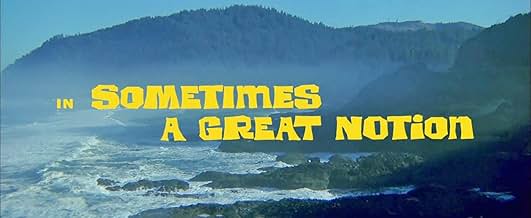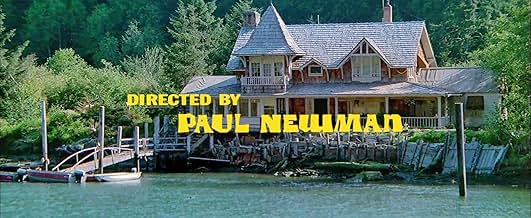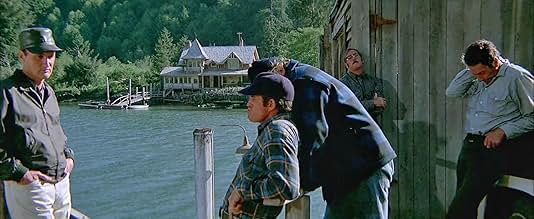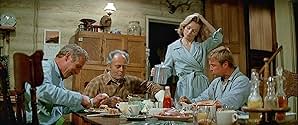AVALIAÇÃO DA IMDb
6,9/10
4,8 mil
SUA AVALIAÇÃO
Uma família de madeireiros independentes do Oregon luta para manter seu negócio familiar vivo em tempos de mudança.Uma família de madeireiros independentes do Oregon luta para manter seu negócio familiar vivo em tempos de mudança.Uma família de madeireiros independentes do Oregon luta para manter seu negócio familiar vivo em tempos de mudança.
- Direção
- Roteiristas
- Artistas
- Indicado a 2 Oscars
- 2 indicações no total
- Direção
- Roteiristas
- Elenco e equipe completos
- Produção, bilheteria e muito mais no IMDbPro
Avaliações em destaque
A lot of people seem to be down on this film for reasons I really can't understand. The film seem to stretch everyone's creative levels especially one performer I'll single out later.
Henry Fonda plays the head of the Stamper clan who own a lot of acreage in Oregon timber country and the family business is cutting logs. Enough to survive, but they do it on their own. But a strike by timber union loggers causes enmity between them and the Stampers who are seen as scabs.
There are some similarities between Fonda's character and the family patriarch he played in Spencer's Mountain. But whereas Spencer had a noble dignity to him, Ben Stamper is a dissolute old cuss who has enjoyed all the vices known and imparted a love for them unto his children. They would be half brothers Paul Newman and Michael Sarrazin who've also got issues between themselves that may prevent the Stampers from forming a united front.
Newman directed the film and he had a good eye for the scenery of the Oregon logging country. And he got some good performances from the rest of the cast. One of them Richard Jaeckel got his career role as a Stamper cousin. Newman reached his creative heights in Jaeckel's death scene which was played between him and Jaeckel. It's a long drawn out affair for reasons you'll know if you see the film. It will stay with you forever as it has me since I saw the film when it first came out. Richard Jaeckel got a nomination for Best Supporting Actor and the pity is that he was up against another popular character actor in Ben Johnson who won for The Last Picture Show.
Sometimes A Great Notion also got a second Oscar nomination for Best Song with We're All His Children by Henry Mancini and Alan and Marilyn Bergman. Bing Crosby recorded a fine version of it on one of his albums. It lost however to theme from Shaft.
Paul Newman deserved a lot more credit for this film than he got. I think if you see Sometimes A Great Notion you'll agree.
Henry Fonda plays the head of the Stamper clan who own a lot of acreage in Oregon timber country and the family business is cutting logs. Enough to survive, but they do it on their own. But a strike by timber union loggers causes enmity between them and the Stampers who are seen as scabs.
There are some similarities between Fonda's character and the family patriarch he played in Spencer's Mountain. But whereas Spencer had a noble dignity to him, Ben Stamper is a dissolute old cuss who has enjoyed all the vices known and imparted a love for them unto his children. They would be half brothers Paul Newman and Michael Sarrazin who've also got issues between themselves that may prevent the Stampers from forming a united front.
Newman directed the film and he had a good eye for the scenery of the Oregon logging country. And he got some good performances from the rest of the cast. One of them Richard Jaeckel got his career role as a Stamper cousin. Newman reached his creative heights in Jaeckel's death scene which was played between him and Jaeckel. It's a long drawn out affair for reasons you'll know if you see the film. It will stay with you forever as it has me since I saw the film when it first came out. Richard Jaeckel got a nomination for Best Supporting Actor and the pity is that he was up against another popular character actor in Ben Johnson who won for The Last Picture Show.
Sometimes A Great Notion also got a second Oscar nomination for Best Song with We're All His Children by Henry Mancini and Alan and Marilyn Bergman. Bing Crosby recorded a fine version of it on one of his albums. It lost however to theme from Shaft.
Paul Newman deserved a lot more credit for this film than he got. I think if you see Sometimes A Great Notion you'll agree.
The date i don't remember, but the day I do. what i did that day i should say. and the movie is still vividly in my mind. I can see the family interplay pretty clearly, but there is 1 scene clearer then all the others.
And more worried about creating a spoiler,
i will only describe it in general terms.
And that is the Death Scene in the picture, I don't want to mention the players in the scene for fear of spoiling it for others. it isn't a short scene, it felt like an eternity, for me anyway.
It is heart wrenching, and has haunted me all these years.
I would like to see this picture again to feel that emotion again.even now just talking around it i feel emotions welling up in me.
worthwhile movie I would recommend it for anyone.
And more worried about creating a spoiler,
i will only describe it in general terms.
And that is the Death Scene in the picture, I don't want to mention the players in the scene for fear of spoiling it for others. it isn't a short scene, it felt like an eternity, for me anyway.
It is heart wrenching, and has haunted me all these years.
I would like to see this picture again to feel that emotion again.even now just talking around it i feel emotions welling up in me.
worthwhile movie I would recommend it for anyone.
I saw this seventies movie for the first time last night. It must be one of the greats. The story line from Kesey's book, and the direction by Paul Newman are so closely woven and with such impact that there are times when one is left emotionally bare. There's not a fault in the casting,and the background of logging is nicely interwoven into the action bringing up surprise after surprise. The only flaw might be the glamorization of Lee Remick - I doubt that her character would show such a degree of grooming and cosmetic sophistication, but, as ever, Ms. Remick gives a performance that is impeccable. If awards were ever to come PaulNewman's way for direction and/or acting surely they should for this masterpiece.
I have read Kesey's novel several times over the last 30 years or so. While I see some merit in this movie version, I'd like to see someone have another go at it. The movie only captures the novel in broad strokes. It hits the major point (brother returns to hometown to exact revenge on older sibling), but misses a lot of the flavor. I think Paul Newman, Henry Fonda and Lee Remick were perfect, as were many of the supporting cast. But Michael Sarrazin didn't quite do it for me. Maybe it was the hair, idunno. I always pictured a sort of geeky-looking, bespectacled, beatnick-looking guy with scruffy hair, but still fairly short, and sideburns. Sarrazin probably could have pulled it off, but back in the early 70s, actors were into looking like people from the early 70s.
But more to the point, the movie needed more back-story. We needed to see Johah Stamper "heading west" with young Henry and his brother. We needed to see Jonah fail and surrender to the dampness of the Pacific Northwest and desert his family. We needed to see young Henry take charge ("we're gonna whup her") and begin the logging business that becomes the crux of the story. Also missed were a lot of great scenes when Henry and Leland were children (Henry rescuing Leland from the Devil's Stovepipe, for one). Also missed was the passing of narrative from character to character. One small portion of the novel is actually narrated by a dog. The novel is written, mostly, in the first person from various points of view. There is a little second person narrative at the beginning of most chapters that pull the reader out of the story to offer additional flavor for the surroundings. Obviously, a novel needs to be pared in order to fit into the standard movie length. It would have to be a rather long movie, three hours or so, to portray the texture presented in the novel. But I'd like to see another go at it, maybe even starring Paul Newman as Henry.
But more to the point, the movie needed more back-story. We needed to see Johah Stamper "heading west" with young Henry and his brother. We needed to see Jonah fail and surrender to the dampness of the Pacific Northwest and desert his family. We needed to see young Henry take charge ("we're gonna whup her") and begin the logging business that becomes the crux of the story. Also missed were a lot of great scenes when Henry and Leland were children (Henry rescuing Leland from the Devil's Stovepipe, for one). Also missed was the passing of narrative from character to character. One small portion of the novel is actually narrated by a dog. The novel is written, mostly, in the first person from various points of view. There is a little second person narrative at the beginning of most chapters that pull the reader out of the story to offer additional flavor for the surroundings. Obviously, a novel needs to be pared in order to fit into the standard movie length. It would have to be a rather long movie, three hours or so, to portray the texture presented in the novel. But I'd like to see another go at it, maybe even starring Paul Newman as Henry.
This is one of my favorite movies. It has excellent acting, a great story (by the late great Ken Kesey), and some very intense scenes. I found that Paul Newman's direction was very well done. This is a movie for fans of great character development.
First, Paul Newman, as usual, did an outstanding job. This is my favorite character. He was able to pull off this very icey dominance, even over his own father. He plays his character like he is Hank Stamper. Paul Newman always does a great job in his movies, but I think this one I especially like because he isn't as likeable as Cool Hand Luke or Fast Eddie (which are two other favorite characters and movies of mine).
Then there is Henry Fonda, who plays the eldest Stamper, Henry. He was a very interesting character, and Henry Fonda did a great job at playing him. He and Hank both head the family, and he and Paul Newman have a fractured relationship that is sort of crass, but still fun to see them on-screen together.
Then there is Michael Sarrazin, who plays the outcast Leeland Stamper. He is probably the best character. While all the other Stampers have leather skin and huge scars from wood chips, he has big bushy hair and is not a big barrel chested logger. Hank and Henry treat him like crap almost the whole movie, because he doesn't belong. Leeland just came back from the city, and he came back for the sole purpose of getting even with Hank.
And Finally, there is Lee Remick, who plays Hank's shut out wife Viv. She is probably the most complex character, simply because she only lets on what she thinks of her situation in little bits. She and Hank used to be wild lovers, but Hank is working so hard because of the logger's strike, he pretty much shuts her out, and so she begins to drift away from Hank.
My only problem with this movie is that they didn't have the big rights of passage fight between Hank and Leeland. In the book Leeland fought Hank after everything bad happened to the Stampers, as a way to show Hank that he isn't in control. I think that was the biggest part in the novel, and they left it out. But aside from that, I loved this movie.
Check this movie, or the book out for that matter, if you enjoy strong character development, many tragic events, and stories that take place in the backwoods of Oregon. 9/10
First, Paul Newman, as usual, did an outstanding job. This is my favorite character. He was able to pull off this very icey dominance, even over his own father. He plays his character like he is Hank Stamper. Paul Newman always does a great job in his movies, but I think this one I especially like because he isn't as likeable as Cool Hand Luke or Fast Eddie (which are two other favorite characters and movies of mine).
Then there is Henry Fonda, who plays the eldest Stamper, Henry. He was a very interesting character, and Henry Fonda did a great job at playing him. He and Hank both head the family, and he and Paul Newman have a fractured relationship that is sort of crass, but still fun to see them on-screen together.
Then there is Michael Sarrazin, who plays the outcast Leeland Stamper. He is probably the best character. While all the other Stampers have leather skin and huge scars from wood chips, he has big bushy hair and is not a big barrel chested logger. Hank and Henry treat him like crap almost the whole movie, because he doesn't belong. Leeland just came back from the city, and he came back for the sole purpose of getting even with Hank.
And Finally, there is Lee Remick, who plays Hank's shut out wife Viv. She is probably the most complex character, simply because she only lets on what she thinks of her situation in little bits. She and Hank used to be wild lovers, but Hank is working so hard because of the logger's strike, he pretty much shuts her out, and so she begins to drift away from Hank.
My only problem with this movie is that they didn't have the big rights of passage fight between Hank and Leeland. In the book Leeland fought Hank after everything bad happened to the Stampers, as a way to show Hank that he isn't in control. I think that was the biggest part in the novel, and they left it out. But aside from that, I loved this movie.
Check this movie, or the book out for that matter, if you enjoy strong character development, many tragic events, and stories that take place in the backwoods of Oregon. 9/10
Você sabia?
- CuriosidadesThis was the first film ever shown on HBO when the service premiered in 1972.
- Erros de gravaçãoIn the fox-hunt scene, when the fox jumps over the fence, it becomes apparent that the fox is wearing a 1/4" black collar with a little tiny bell on it.
- Citações
Hank Stamper: [singing] Don't ever hit your mother with a shovel. It will leave a dull impression on her mind. Paul Newman said the same line in "Butch Cassidy and the Sundance Kid".
- Versões alternativasIn the earliest video release version, circa 1982, when Leland first arrives, a crane shot reveals Hank looking down below at the family reunion. In the most current VHS release, circa 1994, the crane shot is edited out and replaced with just a single cut from Viv, with an audio bridge to Hank on the roof.
- ConexõesFeatured in AFI Life Achievement Award: A Tribute to Henry Fonda (1978)
- Trilhas sonorasAll His Children
Lyrics by Marilyn Bergman and Alan Bergman
Music by Henry Mancini
Sung by Charley Pride
Principais escolhas
Faça login para avaliar e ver a lista de recomendações personalizadas
- How long is Sometimes a Great Notion?Fornecido pela Alexa
Detalhes
- Data de lançamento
- País de origem
- Idioma
- Também conhecido como
- Sometimes a Great Notion
- Locações de filme
- Empresas de produção
- Consulte mais créditos da empresa na IMDbPro
Bilheteria
- Orçamento
- US$ 3.660.000 (estimativa)
- Tempo de duração
- 1 h 54 min(114 min)
- Proporção
- 2.35 : 1
Contribua para esta página
Sugerir uma alteração ou adicionar conteúdo ausente

































